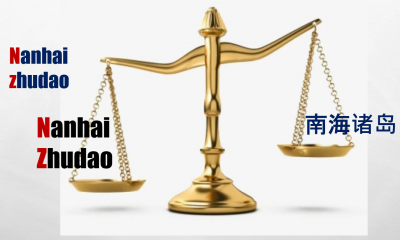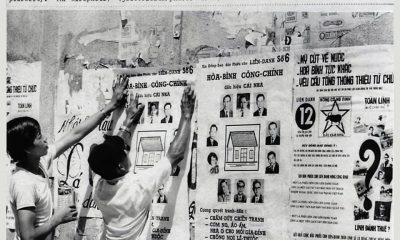The Association for Asian American Studies (AAAS) Annual Conference, April 2021.
Panel Title: Translocative Vietnamese American Historiographies and Anticommunist Republican Nationalisms
Abstract: Scholarship on the Vietnamese diaspora has not explored in-depth the historical origins of this community and the historical processes that continue to shape their identity and discourse. In existing literature, the Vietnamese American story typically begins at the moment they left South Vietnam in 1975 when Saigon fell to advancing communist forces. This panel seeks to reconnect the diaspora to their lost homeland, building on the recent historiographical turn in Vietnamese studies that takes seriously South Vietnam’s wartime republican and anticommunist nationalisms. These ideologies dated back to the colonial period and evolved over decades in the diverse, dynamic, and globalized culture and society in wartime South Vietnam. They continued to develop among South Vietnamese refugees in the United States in response to their experiences of postwar life under communist rule and in exile. By examining the Vietnamese diaspora’s cultural production and reproduction and their political activism, the papers in this panel demonstrate, on the one hand, how their values and identities are robustly rooted in the particular history of their homeland across the Pacific, and on the other, have been dynamic and open to changing circumstances. Understanding of these longstanding yet constantly evolving values will offer a more sanguine perspective into the generational and political tensions in the community as exhibited in the 2020 elections.
Chair: Tuong Vu, University of Oregon
Presenter 1
Paper Title: “When State Propaganda Becomes Social Knowledge”
Name: Y Thien Nguyen, University of Oregon
Abstract: This paper focuses on the process of anticommunist subject formation during the Republican Era (1955-1975) by utilizing the unstudied Political Study Program to explore the development and transformation of South Vietnamese anticommunism. It utilizes the South Vietnamese narrative on the Geneva Accords—an anticommunist narrative taught through the PSP and had persisted throughout the era—to examine the ways in which South Vietnamese anticommunism as a discourse had endured. The paper argues that the persistence of South Vietnamese anticommunism came about through the ritualization of anticommunist beliefs and practices and the persistent and modular deployment of the anticommunist narratives. It concludes by pointing to the continuity of these narratives in Vietnamese America and argues that these refugee communities must be viewed as historical legacies of the Southern Republic.
Presenter 2
Paper Title: “From Reeducation Camps to Little Saigons: Historicizing Vietnamese Diasporic Anticommunism”
Tuan Hoang, Pepperdine University
Abstract: In “From Reeducation Camps to Little Saigons: Historicizing Vietnamese Diasporic Anticommunism,” Tuan Hoang re-examines Vietnamese diasporic anticommunism in the context of twentieth-century Vietnamese history. It offers an overview of the Vietnamese anticommunist tradition from colonialism to the end of the Vietnam War, and interprets the effects of national loss and incarceration on South Vietnamese anticommunists. These experiences contributed to an essentialization of anticommunism among the prisoners, who eventually provided a critical mass for anticommunist activism in the United States since the early 2000s.
Presenter 3
Paper Title: “Vietism: Human Rights, Carl Jung, and the New Vietnamese”
Trinh Luu, University of Oregon
Abstract: In the 1970s, Vietnamese refugees in Japan, Australia, Canada, the United States, and continental Europe indicted the Vietnamese government for human rights abuse. Then as now, the slipstream of human rights activism pulled along their cause, helping to mount pressure on the government to reform. While some refugees appealed to the United Nations, others drew up a unique philosophy to contest the socialist definition of human rights. Vietism, as this doctrine came to be known, grappled with what Vietnamese humanism was, and what it ought to be. Its founders, to that end, turned to German romanticism and Vietnamese antiquity for a model of human rights based on an idea of the collective unconscious. This paper explains their philosophy.
Presenter 4
Paper Title: “Rhizomatic Transnationalism: Nhac Vang and the Legacy of Republicanism in Overseas Vietnamese Communities”
Vinh Pham, Cornell University
Abstract:
For many overseas Vietnamese, the legacy of the Republic of Vietnam (RVN) lives on even after the Fall of Saigon in 1975, owing its resilience not only to the varied and tight networks of Vietnamese refugees, but also by the continual investment and propagation of into the imaginary of the lost republic. In the United States and elsewhere, this cultural investment can be felt most robustly in terms of the music that was written and produced about the RVN. This paper makes the case that rather than leaving some of these songs as examples of nostalgia and melancholy, which has often been done, one ought to instead see them as active agents of nation building for RVN from abroad. Songs were both the effect of the legacy of the RVN, as well as the continual source for its livelihood. Yet this musical legacy will shift now that these previously banned songs are slowly being imported into Vietnam.

 Politics & Economy3 years ago
Politics & Economy3 years ago
 Society & Culture4 years ago
Society & Culture4 years ago
 ARCHIVES4 years ago
ARCHIVES4 years ago
 Politics & Economy3 years ago
Politics & Economy3 years ago
 Politics & Economy4 years ago
Politics & Economy4 years ago
 Politics & Economy3 years ago
Politics & Economy3 years ago
 Politics & Economy4 years ago
Politics & Economy4 years ago
 ARCHIVES3 years ago
ARCHIVES3 years ago




